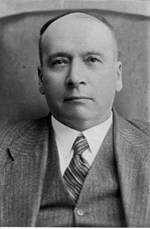
Ernst Mally
 Home Page
Home Page

Ernst Mally (b. 1879, d. 1944) was an Austrian philosopher who worked at the University of Graz. He was a pupil of Alexius Meinong and wrote philosophical works about logic, metaphysics, and morals.
Principal Works:
Mally's Life:
Mally's Advances in Logic:
Mally made (at least) three advances in logic, all of which have proved to be fruitful. First, in his book of 1912, Mally introduced a distinction between two kinds of predication, namely, exemplifying a property and encoding a property. This distinction plays a central role in the theory of abstract objects, and is explained in the document The Theory of Abstract Objects.
Second, Mally was credited (by his teacher Alexius Meinong) with originating the distinction between nuclear and extranuclear properties. Meinong employed this distinction in his naive theory of objects, and recently the distinction was used as the basis of a formal language, logic, and classically-based theory of objects in Terence Parson's book Nonexistent Objects (New Haven: Yale, 1980).
Mally's third advance in logic occurred in 1926, when he developed the first deontic logic. Though Mally's particular axioms for deontic logic suffered from a serious flaw and are no longer used, recent studies suggest that his work can be rehabilitated without too much effort. See Gert-Jan Lokhorst's essay ‘Mally's Deontic Logic’, in the Stanford Encyclopedia of Philosophy.
Mally's Dark Side:
Though Mally deserves respect for his metaphysical insight and work in logic, he later developed (in the 1930s) political and philosophical views about the nature of the state and the individual that were informed by an enthusiasm for National Socialism. See his ‘Wesen und Dasein des Volkes’, in Volksspiegel. Zeitschrift für Deutsche Soziologie und Volkswissenschaft, 2 (1934):70-77; and also Anfangsgründe der Philosophie. Leitfaden für den Philosophischen Einführungsunterricht an höheren Schulen, Vienna/Leipzig: Höder-Pichler-Tempsky, 1938. For complete documentation of Mally's beliefs and National Socialist tracts, see ‘Mally als NS-Philosoph’, by Werner Sauer, in Mally Studien, A. Hieke (ed.), St. Augustin: Academia-Verlag, 1998, 167-191. For a more charitable view, which distances Mally's books of 1935 and 1938 from those of his writings which are more thoroughly corrupted by National Socialist ideology, see ‘Ernst Mally’, by Gerhard Zecha, in The School of Alexius Meinong, L. Albertazzi, D. Jacquette, and R. Poli (eds.), Aldershot: Ashgate, 2001, 191-203.